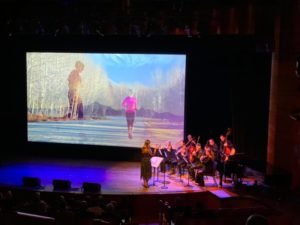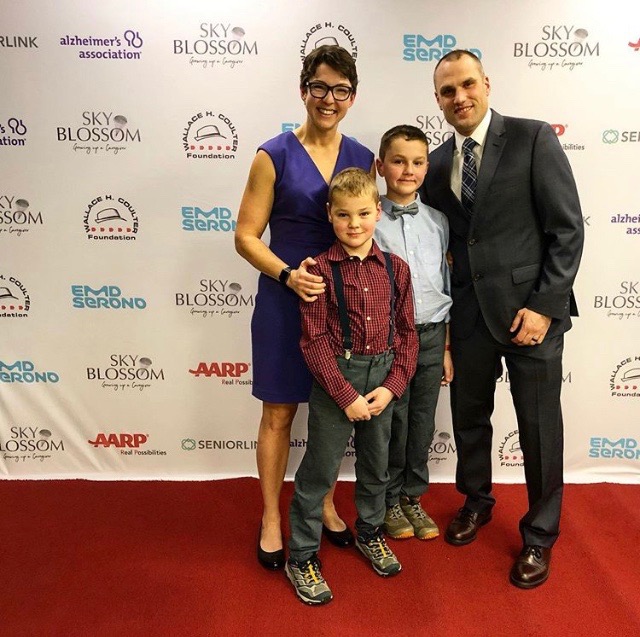Amy Bushatz knows firsthand the power of telling stories, particularly the stories of military families. As a coauthor of Stories Around the Table: Laughter, Wisdom, and Strength in Military Life, and executive editor of Military.com, Amy spends a great deal of time seeking out and writing stories.
Seeing her military family on the big screen brought home the power of her own story. Amy, her army husband, Luke, and their young sons, Dave, 10, and Huck, 7, are among several military families featured in the documentary, Sky Blossom—Growing Up a Caregiver. The Bushatz family joined a select audience at the film’s premier at the John F. Kennedy Center for the Performing Arts. The complete film is set to release in spring 2020.

“It was an emotional journey,” Amy says, of both the production process and seeing the film with an audience. The Bushatz family became part of the documentary when the film’s producer, news correspondent, Richard Lui, approached Amy for her expertise, knowing she had been reporting on veterans issues for more than a decade.
“I told him the topic was of particular interest to me, because it was personal,” Amy recalls. “My husband is a disabled veteran, and I wanted to be sure someone with a news background was covering the story.”
Hearing Amy’s firsthand perspective, Lui shifted his request for help with background to a request for her family to appear in front of the camera.
Amy’s husband, Luke is a member of the Alaska Army National Guard. He was deployed several times as an Army Ranger and has mild traumatic brain injury and post-traumatic stress. Amy says the stories of invisible injuries can be difficult to relate, and the idea of opening up her family’s story gave her pause.
“As a reporter I know what makes a really good story, someone who has a visible problem. Luke does not visibly have a problem.” Amy says. “But if someone is going to tell the veteran story, we’d better have the whole story, and that includes veterans like Luke who have problems that aren’t ready apparent. There are so many like him who have injuries you can’t see.”
“… if someone is going to tell the veteran story, we’d better have the whole story, and that includes veterans like Luke who have problems that aren’t ready apparent. There are so many like him who have injuries you can’t see.”
–Amy Bushatz
The filmmakers traveled to the Bushatz home in Palmer, Alaska, multiple times to interview the family and film them as they went about their daily routines. The crew came in the winter and the summer, spending several days each time. Amy says it was an interesting experience to wear a microphone all day and have someone follow the family around with a camera. The crew filmed the family doing things they would normally do but sometimes on an odd schedule, based on when the weather and the light were good for filming. In addition to the slice-of-life shots, the filming included sit-down interviews with family members, individually and together.
“Huck and Dave thought it was super cool to be in the movie,” says Amy. “They don’t know how not to be honest about stuff. It may not be what you want to hear, but it’s whatever is in their brains.”
For Amy, the interviews were the most difficult and emotional part.
“On camera (the filmmakers) asked me to read a letter Luke sent me from one of his deployments. It was an email he wrote after one of his soldiers died in his arms,” she says. “That is one of the hardest things I’ve ever done. I felt like I was opening up my soul and my husband’s soul to see the rawness of these things we experienced.”
Amy is careful when describing herself as a caregiver but says the role is a universal one.
“Caregiver is a fraught word. It comes with a lot of baggage, because if someone is a caregiver, then it sounds like someone must be broken,” Amy explains. “It’s hard to use that word, especially when you’re talking about care and support for a spouse whom you view as able-bodied and whole. The reality is anyone whole cares for someone is a caregiver, so we’re all caregivers in some way.”
Amy says Luke was open to telling his story for the film, knowing it could be an encouragement to other veterans and their families, even though it was difficult at times for him as well.
Opening Up
“When the rubber hit the road at the documentary screening, that was hard,” Amy says. “We both felt the vulnerability of giving something very personal to someone you don’t know, both the filmmakers and the audience. We were nervous about how it would make us look, how it would make us feel, and what people were going to think about it, but you can’t control that. That’s the risk of telling your story, but we both feel that’s an important thing to do.”
For all that uncertainty and many other reasons, difficult and painful experiences in military life are often not shared, but Amy believes sharing them has a greater purpose.
“If we let people see the rawness wouldn’t that give people a better understanding of the realities of service?” she says. “I think so. Anything we can do to build empathy with our friends and neighbors, whether civilian or military is important because it creates a human connection.”
In the end, Amy and Luke are satisfied the film told their story truthfully, accurately portraying their family and their experience. Amy says entrusting their story to someone else was an exercise in trust for her, a reminder of what it’s like to be on the other side of the news.
Giving Context
“People trust me as a reporter with their stories every day. This time, I was trusting someone else with my story, trusting that the story they’re going to deliver to the world is authentic,” she says.
Personal stories like those in Sky Blossom, add an important human context to the information presented to the public about the military service and military life, and ultimately that’s why the Bushatz family participated in the documentary.
“When I cover the news of military families there’s an information aspect, but there’s the other side of it which is to say, here’s how this military member is dealing with stuff,” says Amy. “What else could be more important than creating connection with other people? Storytelling is the way we do that, maybe the only way. My family is like so many others, and there’s value in stepping out and saying it’s not all great. It’s hard and messy, and then sometimes it’s awesome.”


